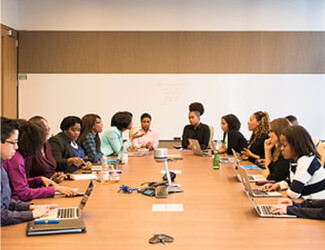Management and Leadership
The question of what makes a good leader is widely debated by corporate, academia, and experts in behavioral sciences. Amidst all the noise, it is clear that the ability to lead depends on a key number of skills. At PACE™ we provide a wide range of Leadership training programs to cater to all levels of leadership. We believe the two most defining quality of a leader are:
1. The ability to be flexible and adapt to changing circumstance.
2.The ability to self-reflect, i.e look inwards and understand one’s self by cutting out self deception.
Organisations that take leadership development seriously outperform those that don’t.
Our high-end leadership programs revolve around self-reflection, leadership strategy, organization and team vision and other elements that are needed for senior leadership teams to drive results and ensure that the core values trickle down to all levels.
Programs for mid-level managers
The next level of programs are for mid-level managers – individuals who have some leadership experience and need to see things from a new perspective to improve their leadership qualities. These programs contain topics that address leaders who are transitioning between mid and senior management. They equip individuals and teams with KSA (knowledge, skills, and attitude) needed to build leadership competencies at the interpersonal and team levels.
Finally, some of our more basic programs are for first-time leaders and entry-level managers. They cover individual leadership and the importance of demonstrating management & leadership competencies even as a team member or an individual contributor.
Core competency
Our core competency is providing bespoke solutions for organisations. We specialize in developing customized programs that are result oriented. Our pedagogy includes a range of training methodologies such as role plays, outbound activities, group exercises, individual activities, videos, case studies, discussions, etc.
The prime objective of the leadership training vertical is to ensure that leadership capability and a coaching culture is built at all levels within the company.

C-SUITE LEADERS
A recent Mc Kinsey Global Survey on executive transitions found that nearly half of top executives say they

EXECUTIVE COACHING
The task of leadership is becoming more complex. Executives need to adapt as their roles change frequently

TOP MANAGEMENT
The environment confronting business leaders today continues to be volatile, presenting great dangers

EMERGING LEADERS
The middle-managers are often viewed as ‘enablers’. While that is true for the most part, it is still a fairly

FIRST-TIME LEADERS
For first-time and front-line managers the step-up to leadership roles could be a daunting and difficult challenge.

COACHING & MENTORING
Many organizations, researchers and leaders have identified coaching as a critical leadership and management

LATERAL THINKING
Lateral thinking is solving problems through an indirect and creative approach, using reasoning that is not

EFFECTIVE DELEGATION
Delegation is the ability to effectively assign tasks, responsibility and authority to others. Delegation is a

CONFLICT MANAGEMENT
Conflict is an inevitable part of life. Almost, it’s hard to avoid conflict entirely – whether in our personal

STRATEGY IN LEADERSHIP
Strategy is an everyday part of leadership. In many ways it is something that every single manager

SELF-AWARENESS
It can be argued that every single person involuntarily engages in some degree of self-deception.

WOMEN LEADERS
Despite compelling evidence that more diversity in senior management ranks increases organisational

CHANGE MANAGEMENT
It is often remarked that the only thing constant is change. Given the level of competitiveness and the pace of change today, leading change has become a core leadership competency and the ability of organizations to learn, grow, adapt and change has become a core

BUILDING HIGH PERFORMING TEAMS
One of the foremost leadership challenge is driving performance through their people. This requires trust and belief in the people’s commitment and capabilities. Especially it is often neglected but ultimately a defining factor in producing results for the organization.
